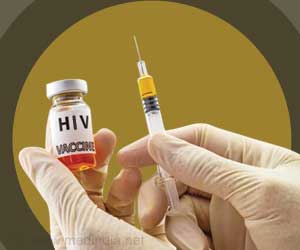Highlights:
- The HIV vaccine
has been under development for several years; however, the development has
not yielded a result
- Scientists have
developed a protein-sugar molecule that shows promise as a candidate
molecule for the HIV vaccine
- The molecule has
been able to develop immunity against four strains of HIV in rabbits.
Researchers
have developed a protein-sugar molecule that has the potential to elicit an
immune response and be included in the HIV vaccine. The
researchers published their study in
Cell
Chemical Biology.
The HIV (human immunodeficiency virus)
infection, which causes AIDS (acquired immune deficiency syndrome),
has devastated the lives of many the world over. It reduces immunity and
makes the patient susceptible to repeated infections and rare cancers. The
social stigma and the almost confirmed fatality often led to isolation of the
patients in the past. The brisk response of scientists in developing
medications prolonged and improved the lives of many patients. The infection
also brought to light the need for preventive measures like the use of
disposable syringes and
safe
sex.
‘A new sugar-protein molecule elicits a good immune response against the HIV virus in rabbits, and shows potential to be used in a vaccine against the infection.’
There have been several
hurdles in the vaccine development, and success has eluded scientists despite
intensive efforts. Some of the reasons are:
- The virus has
several strains and develops mutations. As a result, a vaccine developed
against one strain will be ineffective against another strain.
- The vaccines
being developed could not generate antibodies against the sugar shield
that surrounds the HIV virus.
Researchers
have now developed a protein-sugar molecule, a three-component glycopeptide
immunogen, as a candidate molecule that may be of use in the HIV vaccine. The protein
consists of a part of the glycoprotein 120, the protein in the envelope of the
HIV virus. Since glycoprotein 120 shows variations in the different HIV
strains, the researchers selected a part of the protein which was similar in
different HIV viral strains. Thus, a vaccine developed against this part could
be effective across strains of HIV. The scientists linked it to a sugar group
to form a glycoprotein molecule.
When they injected the
molecule in rabbits:
- The vaccine
stimulated an immune response against the glycoprotein 120 found in four
main strains responsible for HIV today in a period of two months. This was
in contrast to the response produced when only the protein without the
sugar was injected– in this case, the antibodies were produced only
against one strain of the virus
- A substantial
immune response was produced in two months, which is a much shorter
duration as compared to other studies, which took even up to four years.
The study is a small, however, significant step in the progress towards developing an efficient
vaccine for HIV. Further research in the field with along with other vaccine
candidates and for a longer duration will hopefully result in the development of
an HIV vaccine in the near future.
Reference:
- Hui Cai, Jared Orwenyo, John P. Giddens, Qiang Yang, Roushu Zhang, Celia C. LaBranche, David C. Montefiori, Lai-Xi Wang. Synthetic Three-Component HIV-1 V3 Glycopeptide Immunogens Induce Glycan-Dependent Antibody Responses. Cell Chemical Biology. DOI: http://dx.doi.org/10.1016/j.chembiol.2017.09.005
Source-Medindia















